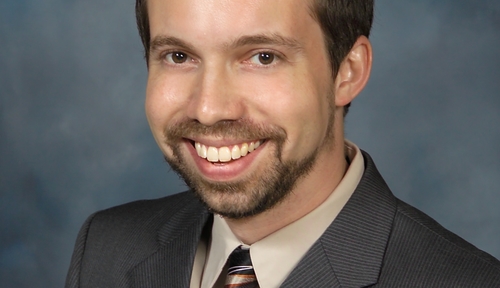UNMC researcher helps lead national survey of more than 1,000 women
A University of Nebraska Medical Center researcher played a key role in a national survey that determined that more than half of women with rheumatoid arthritis (RA) and systemic lupus erythematosus (SLE) have fewer children than desired.
Kaleb Michaud, Ph.D., assistant professor in the internal medicine department-rheumatology section, served as senior and corresponding author on the study, which is published today in Arthritis Care & Research, a journal of the American College of Rheumatology (ACR). While patient choice has some influence on smaller family size, findings published suggest that higher rates of infertility and miscarriage may also impact the number of offspring born to women with these chronic conditions.
The ACR estimates up to 322,000 U.S. adults have systemic lupus – a disease in which the body’s immune system becomes overactive and attacks healthy cells, tissues, or organs. Roughly 1.3 million adult Americans suffer from RA, a chronic autoimmune disease that causes painful joint inflammation. Medical evidence reports that both RA and SLE are more common in women, and onset often occurs during reproductive years which can lead to challenges in family-building.
Megan Clowse, M.D., a rheumatologist at Duke University, served as first author on the survey. Researchers from the University of Oklahoma, Harvard University, and the University of California, San Diego also were involved in the study, which sought to better understand the role of infertility, pregnancy loss and family size choice in women with RA and SLE.
A total of 1,017 female participants in the National Data Bank for Rheumatic Diseases were surveyed. Respondents to the reproductive-health questionnaire included 578 women with RA and 114 with SLE. Based on their responses, they were placed in three categories:
Group A – those interested in having children who had fewer children than planned;
Group B – those interested in having children who had the number of children they planned; and
Group C – those no longer interested in having children after being diagnosed with RA or SLE.
Study findings revealed:
· More than 60 percent of respondents were in group C.
· 55 percent of women with RA and 64 percent with SLE had fewer children than originally planned.
· Women with RA in group A had an infertility rate 1.5 times higher than those in group B, but both groups had similar rates of miscarriage.
· Women with SLE in group A had a similar number of pregnancies as those in group B, but a three-fold higher miscarriage rate.
· The overall infertility rate among participants with RA was 42 percent in women who had fewer children than desired.
· In women diagnosed with RA during childbearing years, the infertility rate was higher than in those diagnosed after childbearing was complete.
· For participants with SLE no significant increase in infertility was noted. However, among women with lupus having fewer children than desired was associated with pregnancy loss.
“Rheumatoid arthritis and lupus and their treatments can pose major problems for women during pregnancy and can even result in birth defects and spontaneous abortion,” Dr. Michaud said. “We hope this study will bring these reproductive-health concerns to the forefront, especially among women in their childbearing years.”
The authors suggest that patient education to enhance awareness of safe medical options during pregnancy and effective control of these autoimmune diseases will assist women with achieving their childbearing goals.
Other concerns that lead to fewer pregnancies in women with RA and SLE included:
· inability to care for their children;
· adverse effects from medications taken during pregnancy; and
· genetic transmission of their disease to offspring.
Dr. Michaud said further study of the underlying causes of infertility and pregnancy loss in women with RA and SLE is an important next step that needs to be taken.
Through world-class research and patient care, UNMC generates breakthroughs that make life better for people throughout Nebraska and beyond. Its education programs train more health professionals than any other institution in the state. Learn more at unmc.edu.
